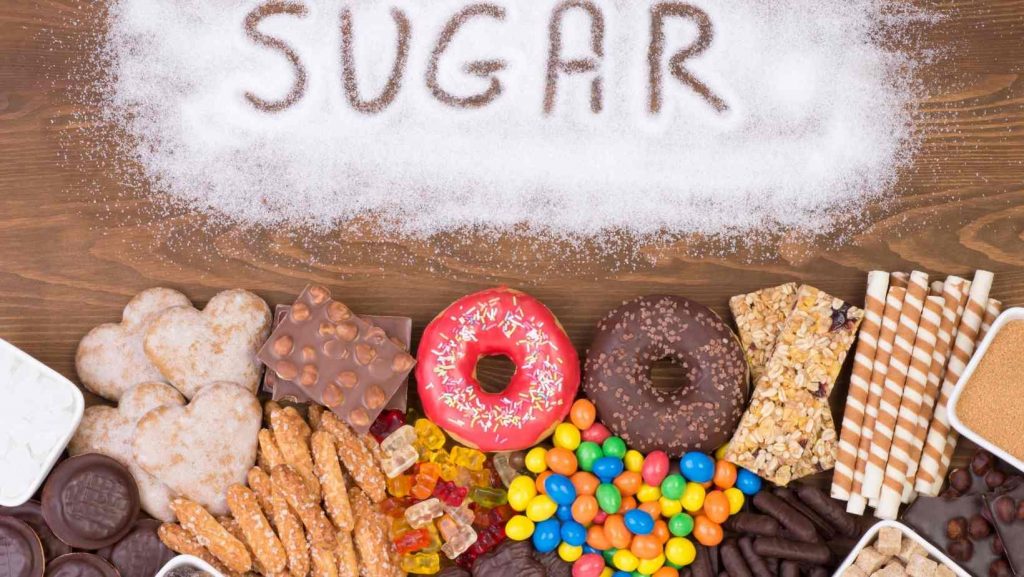Sugar has a poor reputation, although it is a key source of energy and is necessary for human life. Naturally, not all sugars are created equal. Fructose in fruits and vegetables, as well as the lactose in dairy-rich meals, are natural sugars that we don't have to worry about since these foods also include fiber and calcium. Added sugars, on the other hand, which are often present in processed foods, are something we could do without, and the majority of us eat too much of them.
The typical American eats 270 calories of added sugars per day, or 17 teaspoons, according to the Dietary Guidelines for Americans 2020–2025.
Added sugars include natural sugars like honey and maple syrup, as well as anything added to food to make it taste sweeter. "Even if they're healthier than table sugar, they're still high in calories and low in vitamins and minerals," explains Jessica Cording, RD, a New York City-based health coach and author of The Little Book of Game Changers.

According to the University of California, San Francisco, sugar may hide under 61 distinct identities. You could be receiving more sugar than you bargained for, despite your best attempts to eat properly.
Sugar's Harmful Effects on the Human Body
When we ingest sugar, the majority of it is broken down and absorbed in the small intestine, according to Harvard Health Publishing. Larger molecules are attacked by specialized enzymes, which break them down into three simpler sugars: glucose, galactose, and fructose. Some of the glucose is stored as glycogen in the liver and muscles, a molecule that can be converted back to glucose when needed.

However, as glucose enters the system, blood glucose levels rise. The pancreas responds by secreting insulin, which helps glucose get to where it needs to go in your body. When you consume a lot of added sugar, your cells may become insulin resistant over time, which can lead to systemic inflammation, type 2 diabetes, and other chronic diseases.
Consuming too much-added sugar has also been linked to weight gain and obesity, as well as risk factors for heart disease, nonalcoholic fatty liver disease, and cancer, according to a study published in the journal Nutrients in November 2016.
"Excessive added sugar consumption has an influence on our energy, emotions, weight, and illness risk," adds Cording. "It has a broad influence on our physical and emotional health."
“In order for us to function as smoothly and as normally as possible, we need our blood sugar to be operating in the Goldilocks zone of energy,” says William W. Li, MD, a physician in Cambridge, Massachusetts, and author of Eat to Beat Disease.
Do You Consume Too Much Sugar?
Industry organisations have different suggestions for added sugar restrictions. The Dietary Guidelines for Americans 2020–2025, released by the US Departments of Health and Human Services and Agriculture, suggest limiting added sugar calories to no more than 10% of total daily calories. That's a limit of 12 teaspoons for someone who eats 2,000 calories per day.
The American Heart Association, however, recommends limiting the amount of daily added sugars to no more than 100 calories for women and children and 150 calories for men. For women and children, this equates to around 6 teaspoons, while for males, it equates to approximately 9 teaspoons.

Both groups agree that added sugars should be avoided by toddlers and infants under the age of two.
If you’re not getting enough fruits and vegetables in your diet and not eating balanced meals made up of lean protein, healthy fat, and unrefined carbohydrates, it’s possible that added sugars may be displacing other good-for-you foods. Not only are you likely deficient in vitamins, minerals, and fibre, but all that additional sugar might have unintended consequences.
The following 5 signs might mean you’re eating too much sugar.
Jump to:
1. Increased Hunger and Weight Gain
If you’re consuming a lot of extra calories through added sugars, increased hunger is one of the first signs. “[Sugar] is satisfying to the taste buds, but it doesn’t really satisfy or fill our stomachs,” Keri Stoner-Davis, RDN, who works at Lemond Nutrition in Plano, Texas.
Without protein, fiber, and healthy fats, which most processed snacks and sugary treats lack, the body burns through sugar quickly and ramps up hunger, which can lead to mindless and even compulsive snacking, Cording says.

According to a review and meta-analysis, consumption of sugar-sweetened beverages promotes weight gain in adults and children.
Yet it’s not only the extra calories that can increase weight.
The gut microbiome, an ecosystem made up of 39 trillion microorganisms, is the body’s self-defense system, according to an article published in May 2016 in Cell. A healthy gut helps our metabolism regulate blood glucose and insulin levels and, in part, enables our bodies to use lipids and manage cholesterol. “When you have added sugar, it damages that ecosystem,” Dr. Li says.
Good bacteria decrease and bad bacteria overgrow, leading to dysbiosis (an imbalance between these bacteria) as well as problems with metabolism and the ability to properly process lipids and cholesterol.
read also: Delicious High Protein Foods
What’s more, sugar may damage our fat hormones, including leptin, which inhibits hunger, Li argues. “High sugar disrupts metabolism, in part by interfering with leptin,” according to Li. “Eating sugar makes you want to eat more sugar, which makes you more hungry.”
2. Irritability
If you’re feeling moody, irritable, or on edge, stress may not be the only reason — it could be a sign that you’re eating too much sugar.
A study published in January 2020 in the journal Medical Hypotheses suggests that eating added sugars can promote inflammation, worsen mood, and lead to symptoms of depression.
A high-sugar meal or snack without protein and fat quickly spikes your blood sugar, but as your body rushes to process all of it, your energy levels crash, making you feel sluggish and irritable, Cording says.

Also, when there’s low glucose in the bloodstream because your insulin levels have spiked after eating a lot of added sugar, levels of blood glucose in the brain decrease as well. “Our brains are absolutely critically dependent on having a normal level of blood sugar to fuel them,” Li says.
The important thing is to pay attention when you’re feeling off. For example, if you start to feel irritable an hour after you eat a snack or at the same time every day, excess sugar could be to blame. “If you notice that’s happening to you a lot, it’s a good opportunity to take a look at what you’re eating,” Cording says.
3. Fatigue and Low Energy
Sugar is easily absorbed and digested, so if you’re feeling fatigued, it could be due to the amount of sugar you’re getting in your diet.
“Sugar is a very quick energy source, so regardless of how much you eat, in 30 minutes you’re going to be hungry again, low on energy, or looking for energy again,” Stoner-Davis says.

Large swings of blood sugar and insulin can also cause energy levels to plummet and affect your overall energy level, Li says.
read also: 10 Healthy Snacks Your Kids Will Love
4. Foods Don’t Taste Sweet Enough
If you’ve noticed that foods don’t taste as sweet as they used to, or if you need to add sugar to foods to make them taste good (think: dusting your cereal with brown sugar), it could be that you’re getting too much sugar to begin with.
If you’re trying to make healthier choices, say by switching from flavoured yoghurt to plain yogurt, the difference will be more noticeable.

“You train your brain to expect a very high level of sweetness, and when you’re used to that, it can be harder to feel satisfied with foods that are less sweet because you’re primed to expect the high sweet levels,” Cording says.
If you’re replacing sugar with artificial sweeteners in your diet, you may also want to give it a second thought. “A lot of these sugar substitutes are so much sweeter than actual sugar so it tricks our brains into expecting this insanely high level of sweetness,” Cording says. This can increase sugar cravings overall.
5. Cravings for Sweets
If you’re craving sweets, you may be addicted to the feel-good effects that sugar has on your brain. Sugar targets the brain’s pleasure centre (called the mesocorticolimbic pathway), triggering a rise in the so-called "happy hormone" dopamine, Cording says.

This pathway in the brain plays a significant role in the food choices we make, including affecting cravings for sugar.
Put simply, eating sugar increases dopamine, and the dopamine rise itself can increase cravings for sugar, leading to a vicious cycle, according to research.
read also: 10 Healthy Late-Night Snacks
The good news is that focusing on small meals and snacks consisting of real, whole foods, and eating regularly, can help those cravings improve, Stoner-Davis says.
Check out some of our other blog posts now!




